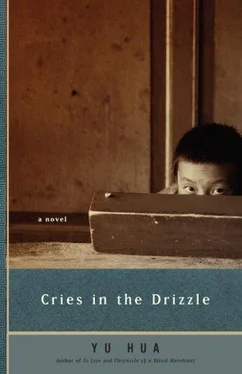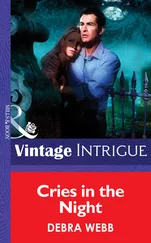Once I rejoined the household, that old fear of Granddad— if it still lingered in my mind at all — soon mutated into self-pity, and as my own position at home grew more precarious, his presence turned out to be enormously comforting. I came to dread the prospect of some mishap affecting the family, knowing that I would be made a scapegoat whatever happened, and so with time I understood why, years earlier, Granddad had felt impelled to pin the blame on my younger brother. During this period my father would often bare his scraggly chest, exhibiting his protruding ribs to the villagers, and spell out plainly why there was so little meat on his bones, all because “I've got two worms eating away inside me.” Granddad and I were like two unwelcome guests steadily burrowing a hole in his grain ration.
After my little brother sawed the table legs, there was to be yet another trial of strength between my father and Granddad. Although my father maintained his bluster till the end, he had suffered a psychological defeat. So after I returned to Southgate I no longer saw my father openly cursing or scolding Granddad as he had been so wont to do earlier. His resentment of Granddad was now expressed only in the most ineffectual way. He would sit on the doorsill and ramble on like an old biddy, muttering to himself mournfully, “People are so much more trouble than sheep. Sheep's wool you can sell, the dung is good fertilizer, and the meat makes a fine dinner. With a relative to support, you're really up shit creek. He's got no wool, and eating him is too big a risk — who would bail me out if I ended up in the slammer?”
Sun Youyuan's composure in the face of such humiliations left an indelible impression on me. He always looked upon these assaults with a kindly eye, even a smile. After I grew up, on occasions when I thought of him, that touching smile of his was the first thing that came to mind. My father dreaded his smile and would quickly turn away, as though anxious to fend off an impending attack, and only after he had put some distance between them and he was all by himself would he start cursing. “He grins like a dead man, but he's perky enough as soon as he starts eating.”
Though now befuddled with age, Sun Youyuan gradually became aware of my tenuous position at home, and he made a point of keeping me at arm's length. That autumn, as he squatted at the foot of the wall sunning himself, I went up to him and quietly stood there for some time, hoping he might say something to me, but his aloof expression made it impossible for us to break the silence. Later, when he heard the faint sound of people knocking off work in the fields, Sun Youyuan stiffly got to his feet and shuffled back into the house. He was afraid that Sun Kwangtsai would see us two undesirables together.
The fact that Granddad and I came home just as the fire was in full swing made Sun Kwangtsai look at us with suspicion for a long time afterward, as though we had somehow brought the fire back with us. In the wake of the conflagration, if Granddad and I ever happened to be in the same place, to my alarm I would hear my father pounding his chest and stamping his foot, shouting hysterically, “My house, my poor house is heading for destruction again! If these two are together, fire can't be far away.”
When I was almost seven, as I was leaving Southgate with Wang Liqiang in his army uniform, I ran into my grandfather, just back after spending a month with my uncle. I didn't realize then that I had been given away and thought I was simply going off on an excursion. My big brother, knowing that I had now dropped out of the sprint competition, did not run to meet Granddad, but stood listlessly at the entrance to the village. His dispirited air made me all the more proud to be leaving in the company of a man in uniform. That's why when I saw Granddad I was so full of myself that I said, “I don't have time to talk to you now.”
As I slipped past my grandfather with my nose in the air, I made a point of kicking up some dust. Now I remember the expression on his face. When I looked back to catch a last glimpse of my big brother, Granddad's ponderous bulk blocked my view, and so it was he who commanded more of my attention. Granddad stood there, looking at me fretfully, as though with misgivings. Of what destiny had in store for me, he knew as little as I did, but on the basis of his own life experience he had reason to doubt that my buoyant mood was warranted.
Five years later, when I returned alone to Southgate, a fateful coincidence brought Granddad and me together at a moment when black clouds were encroaching on the red glow of sunset. By that time we no longer recognized each other. The five years preceding had given me a heavy burden of memories to carry, squeezing my recollections of the more distant past into an obscure corner. Although I could recall my family's faces, their features had grown indistinct, like trees at twilight. Just as my memories had been rapidly multiplying, Granddad was in the opposite situation: infirmity and old age had begun to cruelly ravage his past, and he lost his way on the most familiar road. When he ran into me, he was like a drowning man who sees a plank floating in the water; it was only by sticking close to me that he managed to make it back to Southgate. We and the fire appeared on the scene simultaneously.
The day after our return to Southgate, Granddad left for my uncle's home once again, and this time he stayed for two months. By the time he returned we had already put up the thatched cottage. I cannot imagine how the old man, with his memory deficit and his incoherent speech, managed to make it there and back. He died in the summer of the next year.
Despite having been reduced to servile self-abasement for so long, just before his death Sun Youyuan surprised everyone by recovering his youthful energy, and there was something splendid about the last chapter of his life. Just as the end grew nigh, he summoned his final flickering strength to vie with heaven itself.
That year, when the rice in the fields was almost ready to be harvested, day after day of steady rain caused consternation among the villagers. Standing water was clearly visible in the paddies, covering the earth like a sheet of plastic. The heavy ears of grain drooped lower and lower, gradually approaching the silently rising rainwater. I'll never forget the faces of the helpless farmers as disaster approached, for they looked as desolate as if they were in mourning. Old Luo, the storehouse caretaker, sat the whole day on the doorsill wiping his tears, and issued a pessimistic forecast to the villagers: “This year we're going to have to go begging.”
Old Luo had a phenomenal memory. He could navigate a smooth course through the torrent of history and was able to tell us that the waterlogged fields were a mirror image of those in 1938 and 1960, leading us to believe that we would indeed be beggars soon.
Sun Kwangtsai, who was usually busily engaged in one dubious activity or another, was now as quiet as a sick chicken. But sometimes he would come out with something even more shocking than Old Luo. He told us, “When things get bad, we'll just have to eat dead people.”
Some of the older residents surreptitiously brought out clay bodhisattvas, set them on their altar tables, kowtowed to them, and prayed to Buddha, imploring the bodhisattva to exercise his powers and save the rice crop. It was at this juncture that my grandfather came on the scene like a guardian angel. One afternoon, abandoning his customary position in the corner, he suddenly rose to his feet, picked up his ramshackle umbrella, and went out. I assumed he was planning to go early to my uncle's. He walked falteringly, but his face, pasty for so many years, now shone with a healthy glow. Raising his oilskin umbrella, tottering along through the wind and rain, he visited every house in the village, delivering in a drone the following message, “Throw your bodhisattvas outside and give them a good soaking. That'll put a stop to the rain in no time — you'll see.”
Читать дальше












